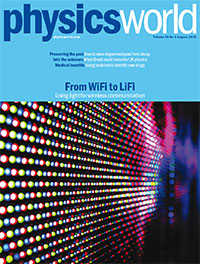 By Matin Durrani
By Matin Durrani
Over the past year the world’s computers, mobile phones and other devices generated some 12 zettabytes of data. And by 2020 that number is predicted to rise to 44 zettabytes – nearly as many bits as there are stars in the universe.
In the August 2016 issue of Physics World magazine – now live in the Physics World app for mobile and desktop – Harald Haas from the University of Edinburgh in the UK explains how the humble household light bulb could soon be transformed into the backbone of a revolutionary new wireless communications network based on visitible light.
Known as “LiFi”, the system could not only contribute to next-generation 5G mobile-phone systems, but also unlock the potential of the “Internet of things”, create”smart” cities, help with the introduction of driverless cars and offer new ways to monitor the health of old people. You can also read the article here.
The August issue also shows how neutrons could help in the search for new drugs, why we need to solve the ethical dilemmas surrounding space mining, and how physicists are helping to save daguerreotype photographs from decay. Don’t miss either our look at the impact of Brexit on European physics.
If you’re a member of the Institute of Physics (IOP), you can now enjoy immediate access to the new issue with the digital edition of the magazine in your web browser or on any iOS or Android mobile device (just download the Physics World app from the App Store or Google Play). If you’re not yet in the IOP, you can join as an IOPimember for just £15, €20 or $25 a year to get full access to Physics World digital.
For the record, here’s a run-down of what else is in the issue.
• UK physics grapples with Brexit – Physicists raise concerns after the UK votes to leave the European Union, as Michael Banks reports
• China’s physics future – Yang Wei – president of the National Natural Science Foundation of China – talks to Matin Durrani about how the agency supports basic research and what it’s doing to boost the quality of physics in China
• Ethics for an “off-world” economy – With asteroid mining set to begin in the coming decades, Tony Milligan warns that ethical questions still need to be answered
• In praise of Descartes – Robert P Crease responds to criticisms of René Descartes made by Nobel laureate Steven Weinberg and others
• A light-connected world – The humble household light bulb – once a simple source of illumination – could soon be transformed into the backbone of a revolutionary new wireless communications network based on visible light. Harald Haas explains how this “LiFi” system works and how it could shape our increasingly data-driven world
• Neutrons for new drugs – Crystallography with neutrons, rather than X-rays, takes a lot of the chance out of drug discovery, as Jon Cartwright reports
• Preserving the past – Physicists have joined the battle to stop daguerreotypes – a prized, early form of photograph – from degrading any further, as Stephen Ornes reports
• Thinking big thoughts – Vlatko Vedral reviews The Big Picture: On the Origins of Life, Meaning and the Universe Itself by Sean Carroll
• Nuclear power’s ups and downs – Geoff Vaughan reviews The Fall and Rise of
Nuclear Power in Britain: a History by Simon Taylor
• A physical feast – Margaret Harris reviews Molecular Gastronomy at Home: Taking Culinary Physics Out of the Lab and Into Your Kitchen by Jozef Youssef
• Diverse opportunities in defence – Working at the UK’s defence laboratory gives Gareth Brown the ability to apply his physics and mathematics knowledge to real-world applications – and not necessarily in the ways you might expect
• Once a physicist – Alan Pierson is artistic director and conductor of the New York-based contemporary-music ensemble Alarm Will Sound, and a professor of conducting at Northwestern University’s Bienen School of Music in Illinois, US
• Paint it nanoblack – Sidney Perkowitz on the search for the blackest black
It is reasonably clear that the Brexit vote will have a far reaching effect on the British science(if it still survives as a united country!), because the important financial contribution from the EU may not continue as there are already indications of this in the context of a push for a deeper economic and political EU-integration.